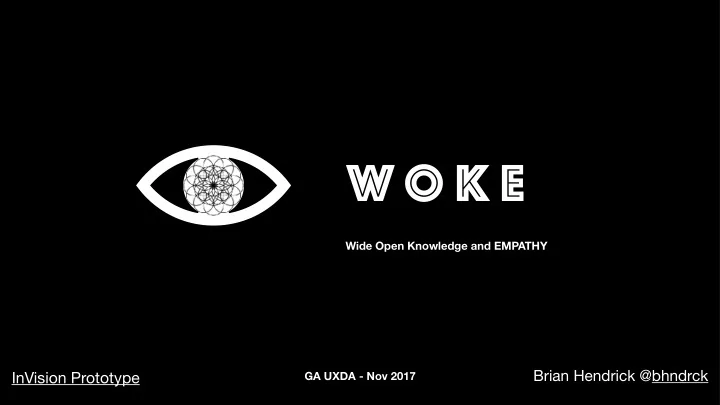

W O K E Wide Open Knowledge and EMPATHY Brian Hendrick @bhndrck InVision Prototype GA UXDA - Nov 2017
The abundance of information accessible through the internet can be overwhelming. Concerning trends like fake news and sneakily sponsored content creates a need to identify the credibility of sources. People get news from the internet (primarily social media), making it di ffi cult to read information outside the political comfort zone within their newsfeed. This lack of visibility (and therefore understanding) of opposing views polarises society. How can people develop an informed opinion and be more empathetic to others with opposing views?
Research User Interviews | A ffi nity Mapping | Personas | Competitor Analysis
Interviewed 8 people between ages of 24-34 All of them use the internet as User their primary news source Interviews All of them try making an e ff ort to stay informed on current events
Mental Exhaustion Avoiding Contrarian Viewpoints “I consider media bias but I do not “I don’t go and seek viewpoints that I know what to make of them do not agree with” sometimes” “I only read sources I can trust” “Sometimes I just want to turn off” “On the weekends I just want to tune- People like staying in their catered out” newsfeed because it is convenient A ffi nity and comfortable Trying to stay informed can be taxing on the brain Mapping Time Constraints “Well TBH I am not able to do my due diligence and research every little news story out there” “Often times its hard and time constraining to read multiple articles so I just read one article” Most people would like to stay informed but just don’t have the time
Meet Mark Age: 25 Location: London Occupation: Account Executive Behaviours: Gets the majority of news and information on topics of interest over the internet, predominately on his phone through news alerts and his social media feed. Frustrations: Persona Not being able to easily identify; bias, fake news, and sponsored content when scrolling through his newsfeed. Goal: Context: Use the internet and his mobile as the primary means to Mark works for a inform his opinion and get a balanced view in a minimal marketing company in East London, he enjoys amount of time. playing videos games and Challenge: rock-climbing on his free time. He understands the On his newsfeed he needs to easily identify sponsored importance of staying content, fake news, and credibility of sources - while informed but sometimes being exposed to various viewpoints. just feels too lazy and overwhelmed.
PROS CONS Fact Checkers Does the due diligence for You have to be motivated you to fact check articles to go on the website to check. Assesses whether statements are truth or They are region or topic lies, and measures the specific. credibility Competitor Content-Blockers Does not work in mobile or native apps. Analysis Blocks specific content like advertisements, and Sponsored content and fake news low credibility news can slip through the cracks. Has the largest database Media Bias Fact Check The mobile app just links of media biases. you to the website Fact checks articles The web-extension only works on Facebook and Introducing a fake-news not very user friendly and content filtering/ blocker
Why build something bespoke and brand new when you can reuse pre-existing data, tools and platforms?
Instead, build a plug-in that utilises existing data and tools to improve the newsfeed experience across various platforms
cross-platform plug-in that improves the UX of writing
Woke cross-platform cross-platform plug-in that plug-in that improves the UX improves the UX of writing of newsfeeds
(idealistic) User Flow Entry Point: when the user encounters an article on their newsfeed with the W O K E plug-in activated Summaries of similar Summary of article articles with and key data contrarian viewpoints Article’s bias and visualisation presented and read credibility presented presented Yes Yes Yes Entry Point End Goal satisfied? satisfied? satisfied? satisfied? N N N O O O Do their Read Read own due Full Multiple diligence Article Sources End Goal: User develops an informed opinion and empathy to opposing views
How do you rapidly prototype a plug-in?
By mapping the onboarding journey
Start Sketching
Put it on Sketch
Make it clickable
Get users to click through it
Keep It Key Simple, Finding Stupid!
Iterate, Iterate, Iterate Iterated from this……
To this……
User friendly means friendly language. Another Key Finding Complex problems and challenging issues don’t have to be hard for the user.
Bring it to a higher fidelity Aesthetic visualisations of data Next steps Designing cross-platforms Partnerships and APIs
Accessibility with NUIs and VUIs Real-time photos of print media Future (augmented reality) Dreams Community workshops: bringing it from digital to physical Premium toolsets for professionals networks
Network with me on LinkedIn /in/hendrickbrian Please Follow me on Twitter keep in @bhndrck touch Check out a website I’m creating: https://rwz.io InVision Prototype: https://invis.io/TG512539421XBU
Recommend
More recommend